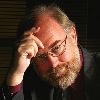

The futurist: Which requires more faith:
Thomas Frey //April 29, 2014//
(Editor’s note: This is the first of two parts.)
For the past several months, I’ve been wrestling with this topic and how to discuss it from a centrist viewpoint.
In an era where the science versus religion debate has become an increasingly polarizing issue, we see both sides using their own brand of logic as the weapon of choice to gain what they assume will be the higher moral ground.
There are no “separation of church and state” policies between science and religion. They struggle to coexist.
In many respects, the battle between them has denigrated into a “My logic is better than your logic,” arguments, when in reality, there are more than enough foibles to go around.
Religion isn’t going away just because some elite scientists say it doesn’t make sense, and science isn’t going to change just because it flies in the face of church doctrine.
No, there hasn’t been anyone put to death because they believed in gravity, although Galileo came very close. And yes, holy wars are the cause of much of the world’s strife and the number of people who have died or been abused in the name of religion are more numerous than any plague.
Even though they employ radically different approaches, both science and religion offer the promise of a better future ahead. They offer hope. And inside each of these promises of hope is a subtle, and sometimes not-so-subtle, request to have faith.
Faith is what bridges the gap between what we know and where we hope to be going. Faith helps us connect cause and effect, bad decisions with good intentions, and everything we think and hope to be true.
Most of our decisions in life have some degree of faith hovering in the background, and science is no exception.
The reason I feel this is such an important topic is because much of our future is being formed at the intersection of science and religion. So join me as we explore bridging the chasm between the here and now and what comes next, and that innocent little thing we call faith.
Statistical Background
According to a recent PEW report on global religions, more than 80 percent of the world’s population is affiliated with a religious organization. So does that mean those who take the side of science only represent less than 20 percent of the world? Hardly.
In 2010, PEW conducted a demographic study based on analysis of more than 2,500 censuses, surveys and population registers – and found 2.2 billion Christians (32 percent of the world’s population), 1.6 billion Muslims (23 percent), 1 billion Hindus (15 percent), nearly 500 million Buddhists (7 percent) and 14 million Jews (0.2 percent) around the world as of 2010. Many smaller groups added another 460 million people to the overall religious community.
At the same time, PEW also found that one-fifth of American adults have no religious affiliation, a trend that has been on the rise for years. Part of this group includes atheists and agnostics, but many fall into the “religious but unaffiliated” category.
There are many overlaps between science and religion:
- A 1914 study by psychologist James Leuba, who surveyed about 1,000 scientists in the U.S. found the scientific community equally divided, with 42 percent saying that they believed in a personal God and the same number saying they did not.
- The 2008 PEW study found that just over half of scientists (51 percent) believe in some form of deity or higher power; specifically, 33 percent of scientists say they believe in God, while 18 percent believe in a universal spirit or higher power.
- 7 percent of scientists say they don’t know what to believe.
In what can only be viewed as the most confusing of all findings, a 2008 PEW study concluded that 12 percent of atheists believe in God and heaven, and 10 percent confess to praying at least once a week.
In Search of the Truth
Both are seeking to find the truth, but truth has become an elusive commodity at best. Here’s a great example.
Benoit Mandelbrot, a Polish mathematician who lived from 1924-2010, was best known as the “father of fractal geometry.” His background included stints as the Sterling Professor of Mathematical Sciences, Emeritus at Yale University; IBM Fellow at the Thomas J. Watson Research Center; and Battelle Fellow at the Pacific Northwest National Laboratory.
At one point in his career, Mandelbrot was asked the simple question, “What’s the distance around a lake?”
He responded by saying, “It depends on your perspective,” and went on to explain.
Viewing a lake from 100,000 feet, the lake has a defined distance, easily measurable. As the altitude decreases, an observer will begin to take note of bays, inlets, and other shoreline formations making the distance around the lake longer.
Moving closer an observer will begin to notice that the shoreline is filled with rocks and trees, and nearing the ground, things like pebbles, plants, and dirt clumps come into view, making the length still longer.
Even resting on the ground, the journey is not over. Once individual grains of sand and pieces of debris become visible, we move into microscopic particles where the distance involves measuring around individual atoms and molecules.
Because of this growing level of detail, the distance around a lake approaches infinity.
The Mandelbrot perspective has far reaching implications when it comes to issues of science, religion, and faith. Is the distance around a lake measurable? It depends on your perspective, and faith has a lot to do with perspective.
Living in a Proven World
What would it be like to live in a world where everything is provable?
Every product we buy would live up to proven expectations, every change in weather would result from proven cause and effect, and every business meeting we enter into would have proven outcomes.
It’s rather ridiculous to even imagine living in that kind of world.
Instead, we have faith that what we’re doing is important. We have faith that the world around us will let us live another day. And we have faith that we can somehow make a difference.
Our lives are filled with trillions of variables, and the science of living is as unpredictable as anything in the universe Virtually everything we do has some element of faith hovering in the background.
Religion’s Unanswerable Questions
Even the best theologians admit there are things they don’t know and can’t answer:
- How does God have no beginning? If God is all-powerful, why does he need humans? What can people do that God can’t?
- How many people does God need? If he needs 100 billion people, is that the magical number, the time when the world will end? What can 100 billion people do that 10 billion can’t?
- Why hell? Why not simply let the bad people die instead of torturing them for all eternity in the fires of hell?
- Why does God even allow the devil to exist? Why allow the devil to tempt us if he doesn’t want us to fail?
With modern technology, our awareness of the world around us grows every day. As our awareness grows, so does our doubt and uncertainty about unanswerable questions.
Next: Science’s unanswerable questions.



























